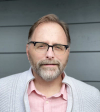Once upon a time, but not so long ago, people had to smuggle Bibles and Christian literature into Eastern Europe and what was then the Soviet Union; border guards would ask travelers if they possessed any “guns, drugs, pornography, or Bibles”; and entire villages shared one copy of Holy Scripture, carefully tearing out pages and passing them around from family to family. On one occasion in the 1980s, an old Romanian man wept and hugged the person who had just delivered a stack of Bibles to their underground church, protected by night’s cloak from the watching eyes of secret police.
Not only was it illegal to possess a Bible, it was illegal to teach the Bible to children under the age of seventeen. Many Christians went to prison and to labor camps or had property confiscated–all for the Word of God. The Communist authorities knew the power of the Scriptures–even though they may not have believed in it, they knew the Bible was dangerously influential in people’s lives.
Although the Soviet Union and the Soviet Communist Bloc are now a part of history, there are many countries in the world today where religious persecution remains strong and the Word of God is considered a risky but precious commodity. It may seem hard to believe, but there are more persecuted Christians in the world today than ever before–including the days of the early church. Places such as North Korea, China, Iran, Eritrea, Nigeria, Sudan, Burma, Sri Lanka, India, Nepal, Pakistan, Bulgaria, Belarus, Turkey, Colombia, Peru, Cuba–the list goes on. We need to remember and support these brothers and sisters, especially in prayer–those who languish in prisons (and sometimes suffer torture and death) and the families they leave behind.
Hopefully, these stories encourage us to embrace our own religious freedom–to embrace the fact that we have Bibles and can meet openly as a church on Sunday mornings. We do not fear soldiers barging in at any moment. This is something I learned from my experiences in taking Bibles into Eastern Europe back in the 1980s. I met people who suffered for the Word of God, which caused me to take my own faith more seriously–and to appreciate the Bible my grandparents gave to me on Christmas Day 1985 and which I still cherish (although the binding is beginning to tear apart and tape patches some well-worn pages).
Soon after these experiences in restricted countries, I began having a daily devotion time each morning before going to work–unfortunately it took such dramatic events to make me finally understand the importance of Scripture to my own life! Even taking five minutes to read a passage was enough to prepare and strengthen my heart for the day. Over the years, this evolved into a fuller daily reading. Some years, I’ll read through the Bible from Genesis to Revelation–or I’ll follow the church liturgical calendar, such as reading portions of the New Testament during Pentecost (the long church season between Easter and Advent). And every time, there is something new and wonderful–the great and awesome love of God manifesting itself on each page.
Martin Luther once said, “The Bible is alive, it speaks to me; it has feet, it runs after me; it has hands, it lays hold of me.” I do believe the Scriptures are alive and that the Holy Spirit is present in the reading of the Word and through the preaching of the Word. At our church in South Hamilton, Massachusetts, we are blessed to have a pastor who loves the Scriptures and who presents the gospel to us in every sermon. That’s another blessing we should never take for granted!
From the Scriptures, we know that the first and greatest commandment is “to love the Lord your God with all your heart, with all your soul, and with all your mind.” In 1 John 4:7, the apostle writes: “Everyone who loves has been born of God and knows God. Whoever does not love does not know God, because God is love.” This sounds very nice, but how can I actually know God? In the special revelation he gives of himself to me through his Word. As Jesus prays in John 17:25-26: “Righteous Father, though the world does not know you, I know you, and they know that you have sent me. I have made you known to them, and will continue to make you known in order that the love you have for me may be in them and that I myself may be in them.”
I teach a class at a small Christian liberal arts college, and we recently looked at those particular Scripture verses in our discussions on love. We also read C. S. Lewis’s book The Four Loves and watched the BBC film Through the Shadowlands–the love story of C. S. Lewis and Joy Gresham. There was a line in the film that really hit home with us: Jack–as he was known to his friends–says to his brother Warnie before ever meeting Joy that she seemed to know him already; that is, she knew him through the books he wrote and through his personal correspondence to her. She came to love him without ever seeing him. My students were struck by how similar that is to our relationship with God. We believe and we love although we have never seen him. We know him through his Word.
Of course, the story of Jack and Joy turns sad when she dies only a few years after their mutual confession of love and marriage. On her hospital bed, she says to him: “I’m a Jew, divorced, broke, and I have cancer. What I want to know is, do I get a discount?” But she had become a Christian and found great solace in her faith, in the Scriptures, and in Lewis’s writings–especially when he says in The Last Battle, the final book of the Chronicles of Narnia, how this life is merely “in the Shadowlands” and that it is only the “cover and the title page” of the “Great Story which no one on earth has read.”
While this is certainly true, we do have a history of the Great Story of God’s love and redemption during this life and in this world. Paul writes in Romans 15:4, “For everything that was written in the past was written to teach us, so that through endurance and the encouragement of the Scriptures we might have hope.” The story–or testament–of God’s love toward us is shown from Genesis 1 when he said, “Let there be light!” to the beautiful end of the tale–or rather the true beginning–in Revelation, when the Bridegroom returns for his Bride and we live with him in this Light for all eternity. God’s promises are abundant and they are true.
Until that great day of Christ’s return, while we live in this difficult yet exciting time of the already and the not-yet, we suffer through daily trials and tribulations. Like Joy in a moment of overwhelming pain, there may be days when we ask if we can “have a discount.” This is another reason why the Scriptures are important–they are full of the struggles of very real people and of the hope and the faith that sustains them. Just reading the “Hall of Faith” in Hebrews 11 should be enough to give us immense encouragement! As the Scriptures teach, life is not easy, especially the Christian life, and certainly not for those under persecution, and we all experience persecution in one way or another–anything that forces our attention away from God or causes our suffering because we remain true to him. But God always proves himself faithful. He has since Day One and there is no end in sight–not for those of us who believe. In the meantime, we have the Bible–God’s Holy Scripture–to help us, to encourage us, to guide us, and to keep us focused. We should cherish it always, to have and to hold from this day forward.
As believers in the persecuted church throughout the years have found solace in the words of the apostle Paul in Romans 8, so let us also hold to them as if our very lives depend upon them–which, I believe, they do:
In all these things we are more than conquerors through him who loved us. For I am convinced that neither death nor life, neither angels nor demons, neither the present nor the future, nor any powers, neither height nor depth, nor anything else in all creation, will be able to separate us from the love of God that is in Christ Jesus our Lord.






